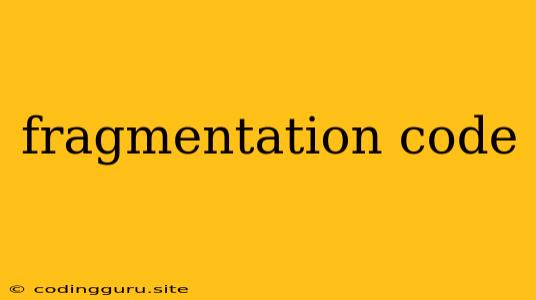What is Code Fragmentation and Why is it a Problem?
Code fragmentation is a common issue in software development, especially as projects grow in size and complexity. It refers to the situation where code is scattered across multiple files, directories, and even repositories in a way that makes it difficult to understand, maintain, and evolve.
Imagine you're trying to fix a bug in a large project. You find a piece of code related to the problem, but it's just a small part of a larger puzzle. You have to jump from file to file, trying to piece together the logic and dependencies. This can be a frustrating and time-consuming process, leading to potential errors and making it harder to refactor or add new features.
Signs of Code Fragmentation
- Difficulty Finding Related Code: You struggle to locate all the pieces of code that contribute to a specific feature or functionality.
- Redundant Code: The same logic or functionality is implemented in multiple places, leading to inconsistency and potential errors.
- Complex Dependencies: It's hard to understand how different parts of the codebase interact with each other, making it risky to make changes.
- Difficulty in Refactoring: Refactoring becomes a major undertaking as changes in one area can have unintended consequences in other parts of the project.
- High Learning Curve for New Developers: New team members find it challenging to grasp the overall architecture and understand how the system works.
How to Combat Code Fragmentation
1. Encapsulation and Modularization
- Break Down Code into Smaller, Cohesive Modules: Group related functionality together into logical units. Each module should have a clear purpose and minimal dependencies on other modules.
- Define Well-Defined Interfaces: Each module should expose a well-defined interface that allows other modules to interact with it in a controlled and predictable way.
2. Design Patterns
- Utilize Design Patterns: Patterns like Facade, Mediator, and Observer can help to reduce coupling and improve the overall structure of your code.
- Implement Dependency Injection: This technique promotes loose coupling by injecting dependencies into objects instead of hardcoding them.
3. Code Refactoring
- Refactor Regularly: Make code changes to improve its structure and readability.
- Focus on Reducing Coupling: Aim to minimize the dependencies between different parts of your codebase.
- Implement Automated Tests: Tests help ensure that refactoring efforts don't introduce new bugs.
4. Consistent Naming Conventions and Code Style
- Follow Clear Naming Conventions: Choose meaningful and consistent names for classes, variables, and functions.
- Enforce Code Style: Use code linters and formatters to ensure that your code adheres to a consistent style guide.
5. Documentation and Comments
- Write Clear Documentation: Document the purpose, functionality, and usage of different modules and components.
- Add Explanatory Comments: Use comments to explain complex logic or make code easier to understand.
6. Code Reviews
- Conduct Regular Code Reviews: Have other developers review your code to provide feedback on structure, readability, and potential improvements.
Example: Code Fragmentation in a JavaScript Project
Consider a JavaScript project where user authentication logic is scattered across multiple files. You might find password validation in one file, session management in another, and user registration in a third. This fragmentation makes it difficult to understand the entire authentication flow and introduces the risk of inconsistencies.
Solution: Encapsulate the authentication logic into a separate module with clear interfaces for login, registration, and password management. This improves code organization and makes the authentication process more maintainable and less error-prone.
Conclusion
Code fragmentation can significantly impact the maintainability, scalability, and overall quality of your software. By adopting best practices like encapsulation, modularization, and refactoring, you can combat code fragmentation and create a more organized, efficient, and robust codebase.
